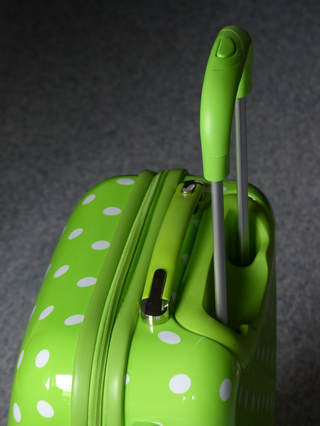|
Giving birth is a lot like a marathon, or so I've been told. I will admit that I have never trained for a marathon. But I know people who have, and here are a few things they have told me about the process that I think apply beautifully to the marathon of labor!
Mental preparedness is key. There are going to be times throughout the process of labor that you'll want to quit, give up, and forget this crazy idea of having a baby (right in the middle of it all!). I've heard moms very close to meeting their babies exclaim, "That's it! Never mind, I'm going home. I'm done doing this!" If you are reading this and you've had a baby, you most likely can relate to this sentiment! I remind moms that when they feel they are "done" and that they can't do this one more minute, second or hour, they are likely very close to the end of the marathon. The physical stamina is important, yes. But the mental stamina is an equally important key to finishing the race! I recommend taking a childbirth education series that will allow you to learn as much as you can about the process so that you know what to expect and how you can prepare. I also encourage positively envisioning, meditating, praying and/or thinking about the birth you want when you look forward to your birth experience. Some moms may find that it's helpful to practice breathing and relaxation exercises, watch *positive* and affirming births (like this one!), and talk through any fears or concerns prior to or during labor. Going into labor with fear or dread can really hinder the process of labor and the production of oxytocin (the hormone so important to keeping labor progressing). Listening to others share their own journeys through the births of their babies during pregnancy can be helpful, but I want to emphasize the importance of keeping those interactions positive. You have to train. Physical endurance is really important. This is why I recommend maintaining some sort of exercise routine (assuming your provider has given you the all-clear). You do not have to stop fitness activities just because you are pregnant. Even in late pregnancy, you can continue to keep your normal exercise routine as long as it's comfortable for you and there's no medical reason to discontinue. Finally, hire a coach! Doulas are gaining popularity as many women have discovered what it feels like to have consistent, continuous support throughout their pregnancies, labors, and postpartum period. You don't have to do this alone. One dad recently told me, "I don't know what we would have done without you. We wouldn't have had the knowledge or expertise to do the things you suggested, and it really made such a difference. Thank you!" Remember, birth is a marathon and not a sprint. You CAN finish the race! (And the reward at the end is better than any medal you could ever receive.)  Pictured: Counter pressure on the low back Pictured: Counter pressure on the low back Are you an expectant mom, thinking of becoming pregnant or currently in the process of trying to conceive? Whatever your individual situation, one thought may be swirling around in your mind: "Can I cope with labor?" It's a valid question. And the answer is yes! Yes, you can! I wanted to list a few ideas here that you may find particularly helpful as your prepare for "Labor Day."
Now it's your turn: If you have given birth before, what tips do you have? What did you find particularly helpful in labor? Comment below! Birth is hard work.
Like the hardest work a woman will ever have to do in her life. It's an incredibly vulnerable time, one in which she may feel frightened, unsure of herself, scared, or even sad. She may worry she can't do this work and might even feel like she has failed if her birth plan isn't going 100% according to plan. She may want to quit, give up, or begin to fight the process. These are all very normal reactions to the overwhelming sensations that labor can bring, but the key to a positive experience, even when things go differently than planned, lies in one thing: Surrendering. The longer I support laboring moms, the more I observe that relinquishing control of the birthing process is absolutely key to a healthy mental and emotional state. But it's really, REALLY hard to do. I know this because I have personally been through childbirth three times with my own children. And each time it was very different. New fears crept in with each birth scenario, and I had to constantly discipline my mind to stay focused and in the moment. I was tempted to watch the clock, get fixated on numbers as they pertained to my cervical dilation, and frankly, quit when it got hard. It was definitely a battle of the mind. One thing I intentionally talk with my clients about is the importance of surrendering throughout the laboring and birthing process. Here are some examples of times when this reminder is particularly useful:
I chose the above picture from a birth I doula'ed about a year ago. I love this photo, because the mom laboring in the tub was very close to meeting her baby, and she was surrounded by so much love and support from those present. When I talked with this mom about her birth experience, she gave me permission to share this with my readers about that moment: "I doubted whether I was strong enough to persevere through whatever the birthing process would bring. Since my baby came three weeks early and caught us by surprise I felt like I wasn't fully ready to face the pain. Through the support and encouragement of my birth team and Happi as my doula, I was able to learn how to give in to each contraction rather than fight them. I was strong enough. I did it!" She surrendered, and...she did it! ~Happi  As a Doula, I provide two prenatal visits for couples throughout the last few months of pregnancy. One visit is to plan the birth and the second is used to discuss all things postpartum once baby arrives. I believe both topics are of great and equal importance in preparing for the two major life events they are about to experience. I spend a good hour or two at each visit helping couples navigate the many decisions and options available to them. If you are expecting, I would strongly encourage you to learn as much as you can about the birth process through childbirth education classes. You cannot formulate a birth plan if you do not understand what your options are. You also need to ask a lot of questions when you tour your place of birth. Here are just a few things you'll need to inquire about in order to create your birth plan. This list is limited but gives you an idea:
Having said that, we know not everything always goes according to plan, but having it in writing absolutely gives the provider and nurses a very solid idea of what you do and don't want. Things like, "Please do not ask me if I want pain medication" take the guesswork out of a situation where mom may be struggling through labor. The nurses know she will ask for help when or if she reaches that point. ~Happi Note: I provide birth planning sessions and private, in-home childbirth education classes. Contact me if you are interested in learning more about your options. This can be a scary time full of many unknowns. I'm glad to answer all of your questions! What should you pack in your hospital bag? Here's a checklist to get your started!
For Mom:
Anything else you'd add? Leave it in the comments below!  As I continue my series on birth and fear, it is my hope that these posts have been helpful to my readers. I have received some wonderful feedback, so thank you to those that are reading! Today I will address another one of the top 10 fears in childbirth: Interventions and complications. As I talk to pregnant women, I am very aware of the fact that there are different views of how women want to birth their babies. Statistics tell us that most birthing women choose to have an epidural and I want to be clear that I support women no matter how they choose to go about induction, pain relief, etc. Many women are completely fine with having interventions in their births and their outcome is still a joyful one. They aren't bothered in the same way that a woman desiring an intervention-free birth might be. I believe that birth choices are very personal and I hold no judgment toward those women who choose a medicated birth, desire to be induced for whatever reason, or even opt for an elective cesarean! To be clear, this post is not an advertisement for choosing intervention-free births, but rather a place for me to address this fear that I heard repeated often as I surveyed moms who are currently pregnant or who have recently had babies. This fear is common among first-time moms who are walking into the birth experience with a blank slate as well as seasoned moms who have had one or more intervention-free births or those who feel that their previous birth(s) was "less than ideal." For moms who sought to have as natural a birth as possible (meaning they desired to not have any medical interventions such as pitocin, an epidural, cesarean, etc.) but ended up with a birth that was filled with them, they may have ended up feeling less than satisfied with their birth experience, if not downright upset. In these cases, women need to be validated and heard. Having well-meaning people say things like, "Well, at least your baby is healthy....that's all that matters," is not always helpful. Birth choices are very personal, and these kind of comments can be hurtful to women who desired to have things go a certain way. They may feel like they failed, or that their body failed them. They may have significant feelings of loss. They may be at risk for postpartum depression or at the very least, have experienced a period of time that they had "baby blues." They may have had trouble bonding with their new baby and maybe even experienced resentment toward him/her. For these women, a repeat of this experience is a very real fear. For both groups, I want to offer what I hope will be helpful advice. First, I encourage you to have a birth plan. I have discussed that at length in a previous post in this series here. Make sure your support system and your care provider(s) know exactly what your wishes are. By being pro-active in this way, you are helping yourself and those around you know what you desire and what alternatives you prefer to pursue before you go the medical route. Second, educate yourself. Read, study, and ask questions of your providers and doula. Know the statistics of interventions, what causes them, and what you can do to prevent them as much as is in your control. Birth is extremely unpredictable, but there are quite a few things that we can control, so knowing what those things are and making sure your support system knows what they are is so incredibly helpful and important. Finally, if you haven't already done so, hire a doula. (I'll bet you didn't see that one coming, did you?) :) There is a great article here on the evidence of how having a doula resulted in more positive outcomes for women. Have a wonderful day! And as always... Thanks for reading! Happi  "Everyone Poops." That's the title of a book my sons always enjoyed reading when they were younger. It's also one of the greatest fears women have in childbirth. I often get asked the question, "What if I poop when I push?" Boys laugh at potty humor. In fact, in my house, that conversation is pretty commonplace. But women tend to be more...discreet. If you deliver in a hospital, you may already be anxious about the point at which all modesty goes out the window when you're on the table with bright lights and doctors, nurses, doulas, and the like in your private space. Add in the possibility of having a bowel movement during all of that flurry of activity and that may be enough to make you want to run for the hills and just not do this whole birth thing. Trust me when I say that one of the things that all professionals in the field of labor and delivery wish women knew was that poop is really not a big deal. It happens. It's as normal and natural to them as sneezing and nose blowing is to us when we have a cold. And doctors are super quick about getting rid of it as if it never happened. They get it. And they aren't freaked out by it. Let me put it this way: If you poop when you push, it means you are doing it absolutely RIGHT. In fact, doctors and nurses will often remind women of imagery associated with having a bowel movement to describe HOW to push effectively when the time comes. So please, dear reader. Do not fear poop. Everyone does it. At least once a day. :) Thanks for reading! Happi  I have spent some time asking for feedback from moms about what their greatest fears were (or are) regarding childbirth. There are several that came up again and again, and today's post will address one of those as I continue this series on birth and fear. Fear Number 2 is this: "What if my wishes are not respected? What if no one listens to me and what I want for my birth and my baby?" Childbirth is deeply personal, and most women, as soon as they are aware that they are expecting, begin to feel very protective of that little person growing inside of them! After all, this baby is not only part of you, but you are feeling the weight and responsibility of taking care of yourself in a totally new way! This is the first step into motherhood: You are responsible for another human being! Here are a few ways to help you have some control over the birth process (because let's face it, birth is completely unpredictable!) and help make your wishes known and heard. Have a birth plan. Let me first preface this point by saying that there is no way to completely plan for childbirth. If there's no necessary reason for a planned induction or cesarean section, then the expectant mom is watching the days tick by on the calendar wondering if today is the day her baby will arrive. This can be a grueling time as her body aches, she's hardly sleeping, she's filled with nesting urges (sometimes at the oddest times) and is feeling the need to get her bag packed (if she's having her baby in a hospital or birth center) and the nursery stocked. The good news is pregnancy lasts approximately nine months, so there's lots of time to plan and prepare! A birth plan is one thing a mom can do in advance that will help her feel more "in control" of what happens to her and her baby once the delivery is imminent. Birth plans are a great tool, and most doctors and nurses are respectful of them if they are kept "short and sweet." By that I mean that it's not always a great idea to walk into the hospital or birth center with three typed, single-spaced pages of details for them to try to follow. Many women don't always realize that doctors, midwives, and nurses are often tending to multiple patients on their shift, and so they really won't have time to read every detail. Here are a few pointers regarding the birth plan:
Stay flexible. As I stated before, there is absolutely nothing that is predictable about birth. So many things can and will happen that may alter your perfectly laid plans, and for those of us that have a hard time "letting go" this can be very difficult to handle. Let me share a personal story with you to underline this point. With the birth of my second child, I had a plan. Everyone knew my wishes, and I expected that it would pretty much be a repeat of my first-born's birth. It was the drug and intervention free birth that I had hoped for, and I assumed all would work out the same with my second. But as the birth progressed, it was becoming abundantly clear that my baby boy was not going to cooperate with that plan! After hours and hours of no progress and doing all I could naturally to bring on contractions (by now my water was already broken), it was clear that using pitocin to stimulate labor was necessary. The pitocin definitely brought on more consistent and strong contractions, however, my doctor soon realized that my baby was not in good position because of the immense pain in my lower back, nor was his head in optimal position to help further dilation (I was "stuck" at 4 centimeters dilated and he was apparently stuck too in poor position!). After a couple hours of pitocin, I was not progressing and was getting frustrated by the minute. The time came when the doctor knew that I was getting exhausted. I wasn't coping well. The baby started to show signs of distress. I was not tolerating things well. This whole progression of events was something I knew could happen but I was not prepared for it happening to me. At that point, I was at a fork in the road. The doctor suggested an epidural, in hopes that I could relax a little and rest, but even more, that my pelvis would relax and the baby could descend. I'm grateful to say that the epidural was effective. Had the final stages of birth gone any longer or gotten any harder, I would have likely ended up having a cesarean section (the doctor said I was moments away from needing one). It was not what I had planned. I had very mixed emotions about how things went with that birth and it took me a while to reach a place of acceptance for what it was instead of what I wanted. The point is this: I was so thankful I had a support system of people who took my hand and said, "We need to be flexible. What you are trying to do is not effective and we need to change course. You're not a failure. You're doing the best thing for you and your baby." As it turned out, an epidural was the best thing for me and my baby. And flexibility was key. Have support. You may notice a recurring theme here, and it's not just because I'm a doula. The fact is, birth outcomes are significantly better and more satisfying when you have a doula at your side. A doula, along with your partner, will know your wishes before the birth takes place and be able to support you every step of the way. She will assist you as you navigate the birth process and help you make informed decisions as things progress. She will encourage you and be your biggest supporter as she partners with your care providers to help you and your baby receive the best care possible. She will make sure you feel heard and respected, and will encourage you to find your voice when you may be afraid to speak up for yourself. I believe that if you are proactive and you've taken the time to formulate a birth plan, commit to being flexible through the labor and have an excellent support system in place, you can be confident that you will be heard and your wishes will be respected when the time of your little one's arrival is upon you. Thanks for reading! ~Happi |
AuthorHappi loves serving families in the Northwest Suburbs of Chicago as a labor doula and childbirth educator. When she's not at a birth, she loves spending time at home with her loving husband and homeschooling her sons. She also finds great joy in serving the Lord at her church and teaching children about the love of Jesus! Archives
July 2024
Categories
All
|







 RSS Feed
RSS Feed